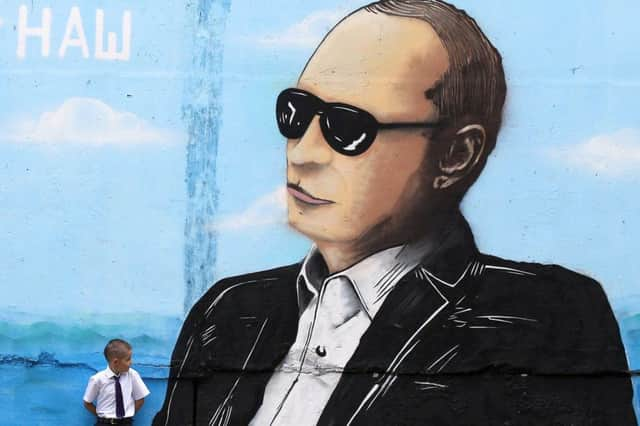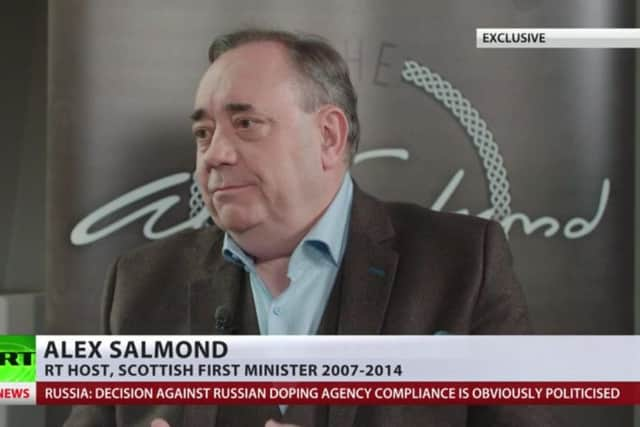Insight: How much can Vladimir Putin influence what we think and do?


It showed a young woman in a hijab apparently ignoring the injured as she walked calmly by, her eyes fixed on the screen of her mobile phone.
Into a febrile collective consciousness popped a single tweet: “Muslim woman pays no mind to the terror attack, casually walks by a dying man while checking phone #PrayforLondon #Westminster #BanIslam.”
Advertisement
Hide AdAdvertisement
Hide AdIt didn’t matter that this interpretation of the events in the photograph was wrong, nor that an inspection of a picture taken almost simultaneously actually showed the face of someone visibly distressed. The damage was done.


The account which sent the tweet, @SouthLoneStar, is currently suspended, but screen grabs show that within two hours of the attack, the image and its sinister caption had been retweeted more than 1,600 times. Its subsequent coverage in mainstream media means it is likely to have been seen by an audience of millions and it continues to be shared online.
Earlier this month the United States Congress published a list of more than 2,700 Twitter accounts with links to the St Petersburg-based Internet Research Agency (IRA). Among the list was @SouthLoneStar.
Troll accounts, which are operated by human beings, send deliberately provocative tweets which are then enthusiastically shared by automated bot (short for robot) accounts.
Operating out of an unremarkable-looking office block not far from the Neva river, the Kremlin-linked Research Agency, or “Glavset”, is believed to have begun pushing propaganda around the time of the 2012 Russian presidential election which saw Vladimir Putin win his third term in office.


But while its original focus was on domestic politics, the project has become steadily more ambitious, turning its attentions to the US and elsewhere.
Researchers at Edinburgh University have identified more than 400 accounts operating out of the agency which have attempted to influence UK politics.
Ben Nimmo, a senior fellow at the Atlantic Council think tank, says tweets originating from the “troll factory” have had a worrying reach.
Advertisement
Hide AdAdvertisement
Hide Ad“Even though the Lone Star account is gone, the photo that it shared and the interpretation it put on it is still there,” he says.
“We don’t know how many people saw the tweet itself, but we know it was picked up by the mainstream media and is still being used by far-right voices today. It reached millions of people in one way or another.”
Nimmo has written about @TEN_GOP, an account which claimed to be the unofficial voice of Tennessee Republicans and which was suspended earlier this year after it was shown to be registered to a phone number in Russia.
“We know that one account, @TEN_GOP, had 130,000 followers on Twitter, was re-tweeted by Donald Trump Jr and was quoted in the Washington Post. It was a really influential voice which everybody treated with respect as an outspoken voice on the American far-right and which we now know was run from the troll factory in St Petersburg.”
Nimmo says Russian troll accounts operating in virtual space have even managed to mobilise demonstrations in the real world, including on one occasion where Muslims and members of the far-right were encouraged to “face off” over the fate of a Texas mosque.
“This is absolutely something we need to be worried about,” he says.
While there has been a growing body of evidence showing Russian interference in US politics since the election of President Donald Trump, the UK has been slow to wake up to the apparent threat. That changed last week with a speech by Prime Minister Theresa May in which she accused the Kremlin of “planting fake stories” and “seeking to weaponise information”.
In recent days the Russian government has been accused of launching cyber attacks on the UK media, telecommunications and energy sectors and of seeking to sow division in Catalonia following last month’s independence vote.
Advertisement
Hide AdAdvertisement
Hide AdProfessor Laura Cram, director of neuropolitics research at Edinburgh University, believes 419 accounts from the 2,752 suspended by Twitter tweeted about Brexit a total of 3,468 times, although mostly after the vote had taken place.
Cram’s research is yet to be published, but she has urged caution about drawing firm conclusions from the relatively small amount of data available.
As if to underline the difficulties associated with understanding this shadowy subject, a Russian troll recently outed online appears to have been nothing of the sort, but rather a Glasgow security guard.
It was an otherwise quiet Monday lunchtime at the offices of independent radio station Ekho Moskvy (Echo of Moscow) when a man broke into the studio and stabbed deputy editor Tatyana Felgenhauer in the neck.
One of a fearless band of Russian journalists who continue to operate amid a culture of intimidation and fear, Felgenhauer – who survived last month’s assault – joined the depressing roll call of those attacked or killed for simply doing their job.
After arresting a man in his 40s, the Russian authorities cited their oft-repeated explanation of “hooliganism”.
However, others pointed to a news report on state television which singled out Ekho Moskvy and Felgenhauer in particular for attempting to advance pro-Western interests in Russia.
According to the international Committee to Protect Journalists, Russia remains one of the most dangerous places on earth to be a reporter, surpassed only by countries such as Iraq, Syria and Mexico.
Advertisement
Hide AdAdvertisement
Hide AdThe most high-profile example of this violence remains the 2006 murder of Anna Politkovskaya, an arch critic of Russia’s war in Chechnya who was gunned down at her apartment building on Putin’s birthday.
Since Politkovskaya’s death, it has become harder for Russia’s investigative journalists to operate, often appearing as lone voices against the monolith of state-run media.
While largely catering for an international audience, that media includes Russia Today (RT), the Kremlin-backed channel which recently signed up former first minister Alex Salmond for his own political chat show.
Angus Roxburgh, who spent 10 years in Moscow as a newspaper reporter and later a BBC correspondent, is critical of Salmond’s decision.
“It lends credibility to a TV station which is a propaganda arm of the Kremlin. I’ve been appalled to see people on Twitter say that RT is no different from the BBC – that’s just an unbelievable misapprehension.
“Their argument seems to be that the BBC is influenced by the government, but RT isn’t just influenced by the Russian government, it’s owned, financed and controlled by it. If the BBC was like RT, you wouldn’t see Jeremy Corbyn on it at all or anyone supporting his views.”
Launched in 2005, RT is now available in more than 100 countries worldwide, broadcasting in English, Arabic and Spanish. Its American channel features former CNN broadcaster Larry King.
Its coverage has received criticism in the West, notably during the 2008 conflict between Georgia and Russia over South Ossetia and following Moscow’s 2014 annexation of the Crimea.
Advertisement
Hide AdAdvertisement
Hide AdAmerican presenter Abby Martin made international headlines when she went off message during the conflict, criticising the Russian invasion of Ukraine. She left RT the following year.
Roxburgh, who has turned down repeated requests to appear on the station, believes the Kremlin sees RT as an attempt to address anti-Russian propaganda flooding in from Western media.
“Almost everything Putin does and has done for the past 10 years is his revenge or retaliation for things he perceives the West did towards Russia,” he says.
“He believes that the West interferes in Russia and Ukraine in an attempt to foment regime change. Therefore he believes it’s his right to do the same in the West. The West constantly bombards Russia through radio stations and newspaper websites with anti-Putin propaganda, as he would see it. Even organisations such as the BBC which try to be balanced and fair, will almost always be reporting on the opposition or Putin’s corrupt cronies. He sees that as hostile coverage of Russia.”
But the former BBC man thinks the impact of Russian influence on UK politics may be overstated.
“I think there’s too little evidence at the moment to say the Russians tried to interfere in Brexit,” he says. “It certainly had minimal effect. For anyone to suggest the outcome of the Brexit vote was changed by Russian interference is just daft. The effect of any tweets from Russian trolls is absolutely miniscule compared with that big red bus promising £350m a week for the NHS.”
A short walk from the Russian consulate in the west end of Edinburgh lies the offices of Sputnik, another state-funded Russian media organisation.
Sputnik set up its operation in the Scottish capital last year, broadcasting radio programmes made largely by local journalists but focusing mainly on international news.
Advertisement
Hide AdAdvertisement
Hide AdIts editor in chief, Egor Piskunov, denies his reporters are following an agenda determined in Moscow. “We have complete independence but we need to make sure we don’t repeat each other and do the same stories, so we have editorial chats with the team in Moscow, and with editors in Moscow and in the US. There’s no phone calls from the Kremlin.”
Piskunov, who worked for RT for 11 years, says part of his team’s mission is encouraging its audience not to just “blindly believe” everything in the UK media.
“We’re no different to other news outlets, but we try to focus on the other side of the story which we feel often is ignored by mainstream media,” he says.
“Almost every day stories are coming out with accusations about Russia. We can’t not report on a story about Russia hacking the US election but we try to explain to the audience that all these accusations are lacking evidence.
“Mainstream [UK] media has built up a trust in its audience that allows them to base a story on what it will call ‘a source from the US intelligence community’. To us, that’s not exactly evidence when you’re talking about a state intervening in one of the most powerful country’s elections. That’s what we’re trying to explain to our audience so they can start thinking about that stuff rather than just blindly believing what they’re being told.
“There are unfortunately double standards and that’s what we try to talk about.”
Piskunov, who shares pictures of his life in Edinburgh with nearly 20,000 Instagram followers, wants people in his adopted home to know he’s not a “Communist robot”.
Asked about the treatment of journalists in his homeland, he says: “I personally don’t represent the government. Anything regarding the government’s actions should be addressed to the Foreign Ministry.
Advertisement
Hide AdAdvertisement
Hide Ad“I just ask people to check out [Sputnik] website or listen to the programme. We try 120 per cent to do stories as balanced as possible because we know that as soon as we make a mistake somewhere, that’s going to be out there and punch us right back in the face. There’s a perception that we’re Communist robots, but we’re normal people. Yes I’m Russian, but that doesn’t mean I’m trying to break up your state.”